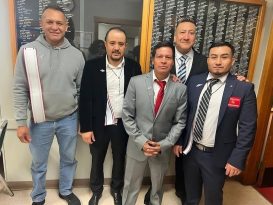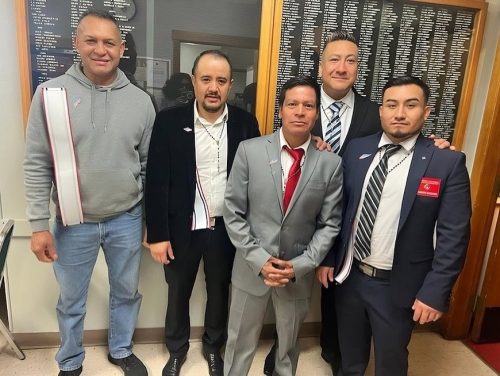By Marietha Góngora V. | OSV News
Catholic communities across the U.S. have been supporting migrant families arriving in the United States fleeing crisis situations by participating in the Welcome Circles, a program developed by the U.S. Conference of Catholic Bishops’ Department of Migration and Refugee Services.
Michele Bulatovic, who manages the program, explained that these groups support migrant families with basic necessities and guide them as they adapt to new communities. According to MRS, 226 circles have been formed and have supported nearly 350 people from Ukraine, Cuba, Haiti, Nicaragua and Venezuela. More than 1,000 volunteers around the country have sought to be part of these circles.
“The circles are really groups of everyday Americans — anybody with citizenship or permanent residency who is interested in supporting a newcomer,” she said. “Many times there are members in the group who were once refugees or asylum-seekers themselves, and they’re kind of wanting to pay it forward. These groups really act like what resettlement agencies normally do.”
Bulatovic told OSV News that the Welcome Circles stem from a national initiative called the Sponsor Circle Program that began in 2021, when resettlement agencies in this country were trying to serve tens of thousands of Afghans fleeing their country after the Taliban returned to power there.
In September 2022, the USCCB joined the private sponsorship efforts launched by the U.S. government to help Ukrainian immigrants. Places like the archdioceses of Boston, Philadelphia and Seattle, as well as the Diocese of Cleveland, have been instrumental in welcoming Ukrainian families. “We worked very closely to support them in their efforts to support community members who want to sponsor Ukrainians,” Bulatovic said.

As of January 2023, the Welcome Circles support other groups of migrants who qualify for parole or temporary stay permits. “When the U.S. government established parole processes for Cubans, Haitians, Nicaraguans and Venezuelans, we also decided to support those nationalities,” she said.
The government’s humanitarian parole program — which recently survived a challenge in the courts — grants short-term legal status in the United States to up to 30,000 asylum seekers a month from Cuba, Haiti, Nicaragua and Venezuela combined. The Biden administration indicated that the program was intended, in part, to deter illegal crossings. It grants some asylum-seekers two years of parole, or temporary permission, to live and work in the U.S., if they have a financial sponsor.
In 2023, the government — in collaboration with refugee resettlement agencies and other organizations — called for groups of at least five or more people to join together in what is called a “sponsor circle” to welcome new arrivals into their community. These programs — like the USCCB’s Welcome Circles — allow religious groups, community groups and other interested individuals to offer sponsorship to those in need of immediate assistance.
Bulatovic explained these circles help newly arrived immigrants find housing, employment and health services. In addition to helping them navigate how to enroll children in school, volunteers also offer support with household supplies and connect them with other available resources. “They do a lot to try to help get these people on a good footing when they arrive, and then hopefully eventually to self-sufficiency,” she added.
“We are a melting pot. It’s been built from the labor of immigrants and most of us have that connection. It’s sometimes forgotten, sadly. But I think it will eventually maybe strengthen our communities,” Bulatovic said.
According to figures from the U.S. Citizenship and Immigration Services website, as of the end of fiscal year 2023, more than 150,000 Ukrainian nationals and their immediate family members had entered the United States under the U4U (Union for Ukraine) process and nearly 238,000 individuals had received temporary stay permits through the CHNV process for migrants from Cuba, Haiti, Nicaragua and Venezuela.
But beyond the numbers, each case represents the story of an immigrant who dreams of a hopeful future. Isidora Cervantes Spotz is a leader of a welcome circle for Venezuelans at St. Mary Magdalen Parish in Everett, Washington State. She commented that there is a circle to serve Ukrainian immigrants and another for those arriving from Cuba, Haiti, Nicaragua and Venezuela, the latter of which was launched in October 2023.
“We are connected with other ministries within the church and with other resources outside of St. Mary Magdalen,” said Cervantes, who in order to serve in this group had to be trained on how to best assist the immigrants who are fleeing dire situations in their countries of origin.
The word “solidarity” perfectly sums up much of the work of the volunteers who serve in these circles. Volunteers support each other — even if they are from other cities — to help those who need to start over, so that their future does not depend on good luck but on concrete facts and trustworthy information that guide them while they learn how this country works, program organizers said.
Cervantes said she was grateful for the support the circle found in Amy Nash and Chris Koehler, both from the Archdiocese of Seattle’s Immigrant and Refugee Ministry. The archdiocese has provided guidance and connected volunteers with MRS resources and tools to accompany new arrivals.
And this Welcome Circle made all the difference for Venezuelan Martín Landaeta and his family. Landaeta arrived in the United States two years ago and, a few months ago, was fortunate enough to be reunited with his family thanks to the humanitarian parole process.
“He waited a long time, and he is a very faithful man, praying and praying. We kept the faith, and it was all glory to God. But it was finally done, and then we connected him and helped him” to pay for part of an apartment, said Cervantes. She also highlighted Martín’s active participation in his parish, where he is also a member of the Knights of Columbus.
According to Ron Enneking, pastoral assistant for the administration of St. Mary Magdalen, this community has more than 3,000 Hispanic, Vietnamese, Filipino, African and Anglo families. “It’s a very welcoming parish with lots of different groups.”
Enneking said that this church is located in an area with a high rate of homelessness and where working-class families live and make up this parish community with limited resources and great need. But this has not been an obstacle for solidarity to manifest itself among community members, religious and volunteers.
Last August, Samuel Landaeta, Martín’s son, arrived in the U.S. with one of his brothers. “They helped us with the whole legal process before we came here,” Samuel Landaeta said. “They filled out the paperwork and the parole application,” he added.
Samuel is grateful to have had the support of his Welcome Circle volunteers, from whom he received financial help for rent, clothes and paperwork, among other expenses.
It was also thanks to this group of volunteers that Samuel found out how to validate his degree and study at the college. “I talked to a group leader, and she gave me several tools to look at the option of studying,” said Samuel, 23, who is a telecommunications technician.
At the same time, he urged those who, after seeing news reports of crimes perpetrated by some Venezuelan migrants, stigmatize all Venezuelans to know that the majority of asylum-seekers from his homeland are good people. “There are many of us who arrived with the dream of continuing to advance, to find ways to adapt, to progress, and to be useful citizens for this country,” he added.
– – –
Marietha Góngora V. writes for OSV News from Washington.






















